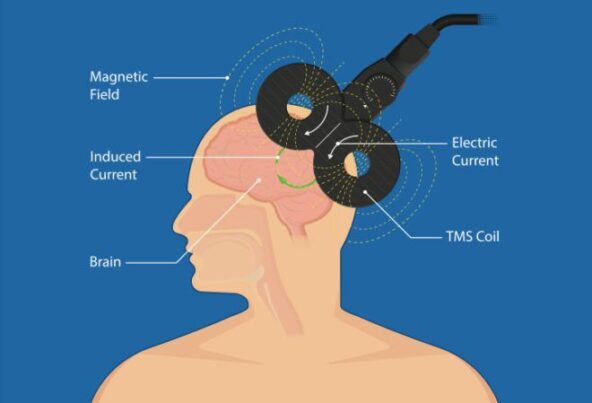Repetitive Transcranial Magnetic Stimulation (rTMS) and its Side Effects
Have you tried multiple methods to treat depression without success, with no improvement from any therapeutic approach? If your answer is yes, then rTMS therapy might be the optimal choice.
r’TMS therapy is used for treating depression and certain psychological and neurological disorders when other treatments are ineffective.
Despite its success in aiding many individuals and improving their mental well-being, it has some side effects that you should be aware of.
Therefore, in this article, we will talk about Repetitive Transcranial Magnetic Stimulation (rTMS) and its side effects.
Repetitive Transcranial Magnetic Stimulation (rTMS)
rTMS is a type of brain stimulation therapy used to activate brain nerve cells and improve mental and neurological health disorders.
It is a safe and non-surgical medical technique that utilizes repeated electromagnetic pulses, hence the term Repetitive Transcranial Magnetic Stimulation.
The U.S. Food and Drug Administration has approved its use for treating depression and certain other psychological and neurological disorders when standard treatments are
ineffective.
When is rTMS used?
It is primarily used in treating depression when other depression treatment methods have been unsuccessful.
If you are someone who cannot tolerate Electroconvulsive Therapy (ECT) or has a history of seizures and cannot undergo anesthesia, rTMS therapy is utilized as an alternative treatment.
r’TMS is only used when standard treatments for psychological and neurological disorders are ineffective, so you should try medications and other treatments first.
Once the ineffectiveness of standard treatments is proven, rTMS is used in the treatment of the following psychological and neurological disorders:
-Obsessive-Compulsive Disorder (OCD).
– Bipolar Disorder.
– Migraines.
– Addiction to smoking, alcohol, or drugs.
– Alzheimer’s disease or recurrent forgetfulness.
– Motor recovery after paralysis.
– Pain resulting from peripheral nerve disorders.
– Stroke effects.
– Epilepsy.
– Schizophrenia.
– Generalized anxiety or panic disorder.
– Parkinson’s disease.
-Tinnitus or auditory hallucinations.
Who shouldn’t use rTMS treatment?
According to Dr Ahmed Missiry, rTMS treatment is not suitable for patients with a history of epilepsy or seizures, or those with a medical condition that increases the risk of seizures.
It is also not suitable for patient’s taking stimulants or those with dental fillings or braces.
Patients with any type of non-removable metal implants in their heads are not suitable for using this treatment, including:
-Electric probes for monitoring brain activity.
– Neck or brain supports.
– Facial tattoos with metallic ink or magnet-sensitive ink.
– Metal devices implanted in or near the head.
– Clips or coils expanding blood vessels.
– Shrapnel or bullet fragments in or near the head.
– Metal implants in the ear and eye.
– Deep brain stimulators.
Its Side Effects:
There are some mild to moderate side effects associated with rTMS treatment, including:
– Mild headache.
– Feeling lightheaded.
– Temporary hearing issues due to the loud noise generated by the electromagnetic pulse sounds.
– Sensation of pain or redness at the stimulation site, which is the scalp where the magnetic coil is placed during the session.
– Occasional temporary mood changes during or after sessions.
– Sleep disturbances during or after the treatment period.
-Sensation of facial tremors.
In conclusion, it’s important to note that side effects typically diminish after the first week of treatment.
However, if symptoms persist beyond the initial two weeks, it is advisable to consult with your doctor to adjust the electromagnetic pulse intensity for a more comfortable treatment and to minimize side effects.
References:




